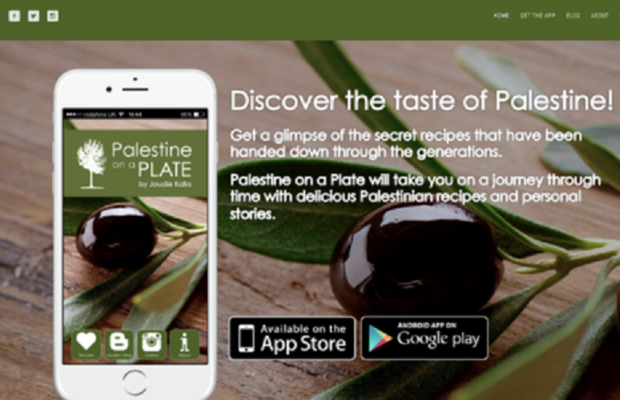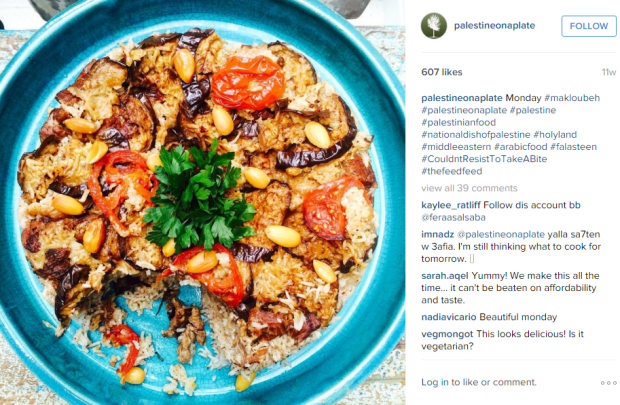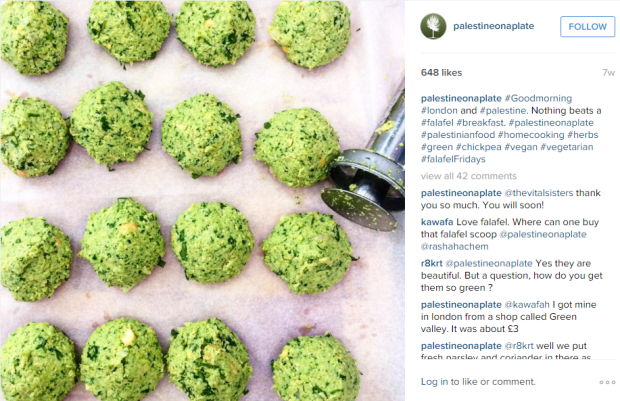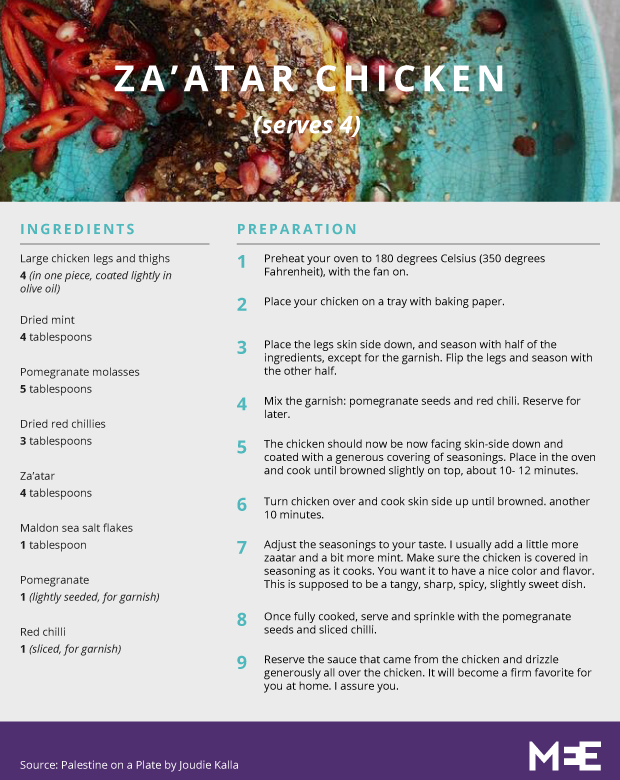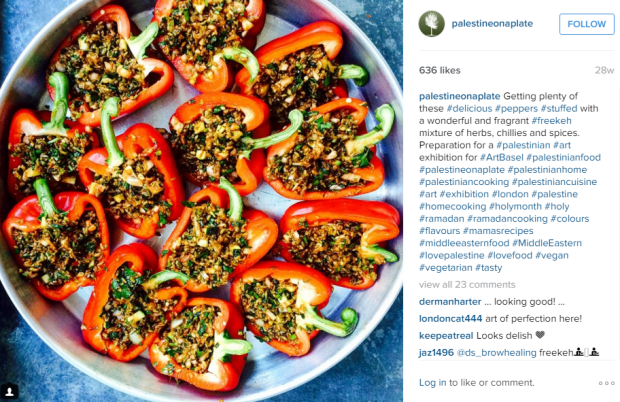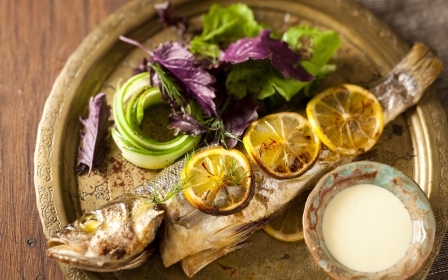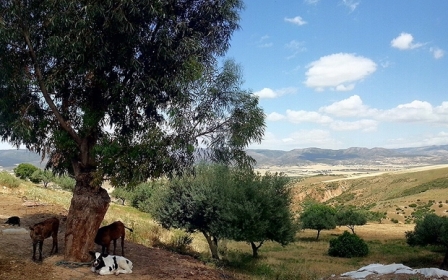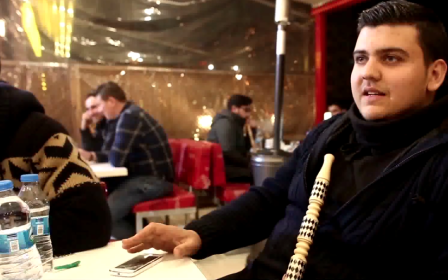Chef's app and cookbook reclaim Palestinian culinary heritage
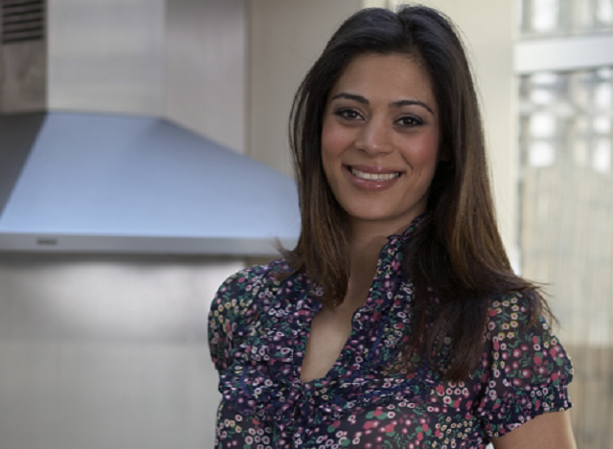
LONDON - With strands of pickled cabbage, vivacious red drops of pomegranate seeds and swathes of green zaatar dusting rose-tinted fish, the short-sighted could be forgiven for mistaking any image of Joudie Kalla’s dishes with an early Jackson Pollock.
The British-Palestinian chef’s Instagram feed is a sumptuous taste of Kalla’s new cookbook, Palestine on a Plate, which will be published later this year and is based on the soaring popularity of her smartphone app of the same name.
After her experience opening a restaurant in Chelsea, and seeing the new wave of Israeli cuisine popping up around London, Kalla became fuelled by a mission to preserve and promote Palestinian food - an important niche which seems to have been forgotten, or some say replaced, in the new Middle Eastern culinary explosion in the West.
“Palestinian food is often referred to as generic Middle Eastern cuisine, or even passed off as Israeli,” Kalla told Middle East Eye, shaking her head. “I saw maqlouba advertised as the ‘National Dish of the Day’ in an Israeli coffee shop in London last week – my great-great-grandmother cooked this in a land of Palestinians and Jews and Christians, way before the creation of what we now know as Israel.”
A Middle East culinary craze
The recent boom in Middle Eastern gastronomy means a search for Middle Eastern cookbooks on Amazon reveals three of the top five results being books by Israeli chefs. From 543 results, there are just three well-known cookbooks published by Palestinian authors, one of which is advertised as Lebanese cuisine.
Kalla explained how there are subtleties in Palestinian cooking which distinguish it from that of its Arab neighbours, such as how Palestinians use string beans instead of the butter beans which are favoured in Lebanon, and how the zaatar is created differently from that in Syria.
Fritha Saunders, Kalla’s editor, said of the project: “I was intrigued by the food of Palestine, about which I didn't know a huge amount. Although there are similarities with food from other parts of the region, I quickly realised that it has its own flavours and cooking styles that make it a really interesting cuisine.”
“Middle Eastern food is very popular in the UK but there were not really any cookery books that focused on food from Palestine in particular.”
Despite Palestine’s rich gastronomic heritage, Kalla alluded to difficulties many Palestinian chefs face in getting published nowadays.
“Palestine on a Plate is quite a bold title,” she laughed. “But if you omit ‘Palestine’ from the title then it is just like any other Middle Eastern cookbook, and my publishers have been really great at understanding that the whole point of this project is to celebrate Palestine, and its wonderful cuisine and culture.”
“Other cookbooks are all roses, petals, jam and honeysuckle with nice cute names, which is great and serves their purpose, but Palestine on a Plate is a fact, it’s direct and it doesn’t mess around,” she added.
'It is important for us to have a voice'
According to Kalla, maqlouba - roasted chicken with spices, rice and vegetables - and sayyadiyeh – cumin and lemon marinated fish served with cumin rice and tarator sauce (not to be confused with tartar sauce) - are some of the more popular Palestinian dishes that are cropping up in the new Middle East craze, but aren’t being credited as Palestinian.
“To give another example, there are two original words for 'Israeli couscous' – in Palestine we call it maftoul – which is an Arabic word derived from the root 'fa-ta-la' which means to roll or to twist as they are hand-rolled balls - and in Egypt it is called moghrabiyeh. Literally the word means "from the Magreb" which is North Africa - it is these kinds of little details which are disappearing,” Kalla said.
The debates surrounding food ownership are framed in a context of a nearly half-century long Israeli military occupation of Palestinian land. Israel’s actions, which most of the international community has criticised as violating international law, means the alleged appropriation of Middle Eastern food is to the chagrin of citizens from many other Arab countries, as well as Palestinians.
“It is not only Palestinians who are incensed by Israeli claims. The Lebanese consider hummus iconic to their cuisine, and falafel is claimed to have an ancient heritage in Egypt, where it is also known as taamiyya,” said Sami Zubaida, a research associate at the SOAS Food Studies Centre who specialises in Ottoman history and culinary cultures.
Speaking to MEE, Zubaida said: “Food is one of the most enduring items of diasporic cultures, and in the case of Israel this trend was reinforced by the widespread adoption of Middle Eastern foods in the country at large.”
“Israelis point to the Jews of the Levant, such as those of Aleppo, as original protagonists of these foods, and as such a title for common or cosmopolitan ‘ownership,’” he explained.
However “Palestinians and other Arabs consider the appropriation of their culinary cultural heritage as one more affront after the occupation of much of their land and the continuing encroachment on what remains as well as their legal and political marginalisation”.
'A love story to my mum'
It has long been acknowledged that media coverage of Israel and Palestine is skewed, a lot of reports ignore the context and realities of Israel’s military occupation, and consequently paint Palestinians as arbitrary aggressors. Kalla hopes, in her own small way, to slowly redress the balance and shift perceptions about Palestine little by little. Kalla states that her primary aim with the app and the cookbook is to celebrate her heritage, and thus present to the world an alternative image of her country.
“My mission is to create a romantic side of Palestine which people have forgotten,” Kalla said. “I want to portray us as a culture and a country that existed before these lines were drawn.”
The British-Palestinian chef was born in Syria, and is the grandchild of Palestinian refugees who were forced to flee their homes in 1948, a period Palestinians refer to as the Nakba. Kalla narrated the incredible story of how her grandmothers met while walking from Palestine to Syria, both of whom were widows with 20 children among them, and were to soon give birth to her mother and father.
Fadia, Kalla’s mother, embellished details of the family’s history. “While my life began in Syria, my mother - Joudie’s grandmother - would tell us stories of life in Palestine and how they enjoyed their community and lifestyle there,” she said.
“She was a strong Palestinian woman who adjusted to a situation that she had to, but my mother’s heart was always home in Yaffa [Jaffa]. Gong to the sea, fishing, playing with friends under the Yaffa [Jaffa] trees. Our family still have the key to her house which she was told she would be able to return to in a few days - it has been nearly 70 years and we are still waiting.”
When asked about how she feels about the country her parents were expelled from, Fadia immediately answered that she thinks about returning to Palestine everyday.
'The thing that most connects someone with their home? The food'
With over 20 mouths to feed, cooking was a family affair for Kalla’s grandmother, and against the backdrop of exile and dispossession food provided a pervasive connection to the land her family had lost and the historical memory of their origins.
“The memories we had were mainly through the food our mothers cooked … Our Mothers were Palestine for us. They were very determined to install this in us and make us connect with our history and to never forget where we came from,” explained Fadia. “Food is special for me because generations of cooking from my Palestinian ancestors have been passed down; it celebrates our history and our family.”
When speaking of Palestinian food it is easy to see where Kalla inherited her culinary passion from, as her mother excitedly described the delicacies behind her favourite Palestinian dish.
"Musakhan is chicken coated with sumac and onions on sour and tangy taboon bread that is dripping in olive oil and pine nuts. The texture is just amazing for me and it is a truly Palestinian dish.”
“I love everything about Palestinian food,” she said. “I love the variety and I love simple yet very flavourful dishes that come from so few ingredients. I love that all the people that Joudie has cooked for love it, because she is cooking what I taught her, so it is an extension of me.
“Palestine is Joudie, and Joudie is Palestine."
The Palestine on a Plate app is available to download via iTunes and the cookbook ‘Palestine on a Plate: Memories from my Mother’s Kitchen’, which is expected to have approximately 100 recipes that differ from those detailed on the app, is being released in September 2016.
New MEE newsletter: Jerusalem Dispatch
Sign up to get the latest insights and analysis on Israel-Palestine, alongside Turkey Unpacked and other MEE newsletters
Middle East Eye delivers independent and unrivalled coverage and analysis of the Middle East, North Africa and beyond. To learn more about republishing this content and the associated fees, please fill out this form. More about MEE can be found here.


